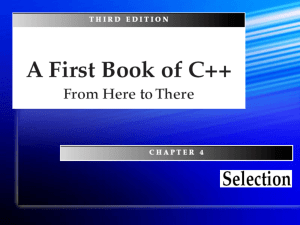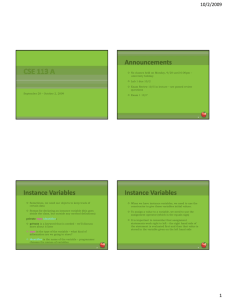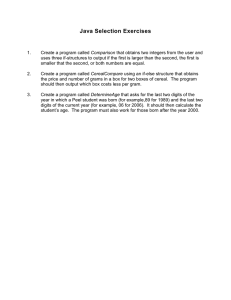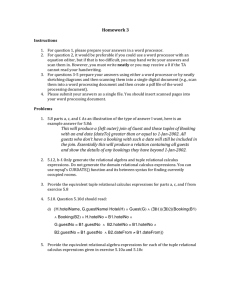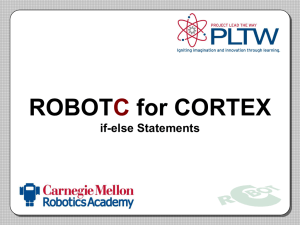عرض الفصل الرابع برمجة 1
advertisement
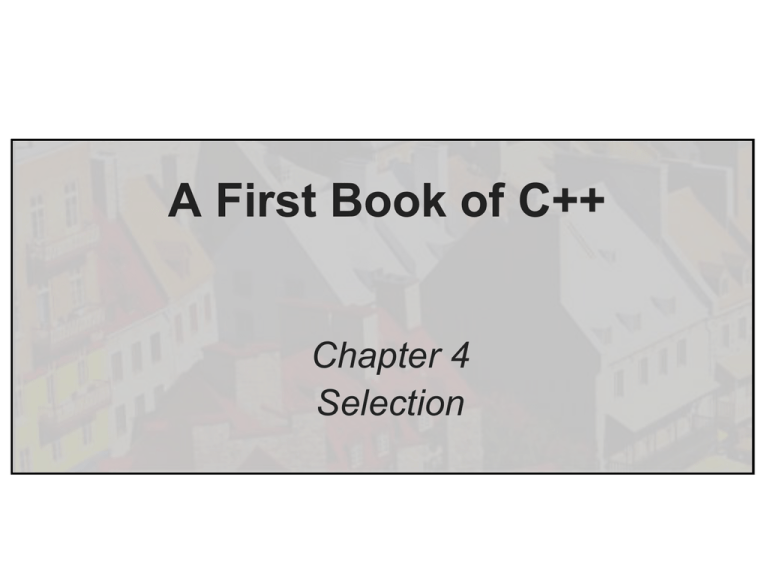
A First Book of C++
Chapter 4
Selection
Objectives
• In this chapter, you will learn about:
– Relational Expressions
– The if-else Statement
– Nested if Statements
– The switch Statement
– Common Programming Errors
A First Book of C++ 4th Edition
2
Relational Expressions
• All computers are able to compare numbers
– Can be used to create an intelligence-like facility
• Relational expressions: expressions used to
compare operands
– Format: a relational operator connecting two variable
and/or constant operands
– Examples of valid relational expressions:
Age > 40
A First Book of C++ 4th Edition
length <= 50
flag == done
3
Relational Expressions
• The following are examples of valid relational
expressions:
age>40
length<=50
width>7
3<4
flag==done
idNum==682
day!=5
2.0>3.3
hours>40
• The following examples are invalid:
length=<50 // incorrect symbol
2.0>>3.3
// invalid relational
operator
flag= =done // spaces are not allowed
A First Book of C++ 4th Edition
4
Relational Expressions
• Relational expressions are evaluated to yield a
numerical result.
• A condition that’s interpreted as true evaluates to an
integer value of 1, and a false condition evaluates to
an integer value of 0.
• For example, because the relationship 3 < 4 is
always true, this expression has a value of 1, and
because the relationship 2.0 > 3.3 is always false,
the value of the expression is 0.
A First Book of C++ 4th Edition
5
Relational Expressions
• This can be verified by these statements:
• Cout << “The value of 3 < 4 is “ << (3 < 4);
• Cout << “\nThe value of 2.0 > 3.3 is “ << (2.0 > 3.3);
• These statements result in the following display:
• The value of 3 < 4 is 1
• The value of 2.0 > 3.3 is 0
A First Book of C++ 4th Edition
6
Relational Expressions (cont'd.)
A First Book of C++ 4th Edition
7
Relational Expressions (cont'd.)
• Relational expressions (conditions):
– Are evaluated to yield a numerical result
– Condition that is true evaluates to 1
– Condition that is false evaluates to 0
• Example:
– The relationship 2.0 > 3.3 is always false;
therefore, the expression has a value of 0
A First Book of C++ 4th Edition
8
Logical Operators
• More complex conditions can be created using
logical operators AND, OR, and NOT
– Represented by the symbols: &&, ||, !
• AND operator, &&:
– Used with two simple expressions
– Example: (age > 40) && (term < 10)
– Compound condition is true (has value of 1) only if
age > 40 and term < 10
A First Book of C++ 4th Edition
9
Logical Operators (cont'd.)
• OR operator, ||:
– Used with two simple expressions
– Example: (age > 40) || (term < 10)
– Compound condition is true if age > 40 or if term <
10 or if both conditions are true
• NOT operator, !:
– Changes an expression to its opposite state
– If expression is true, then !expression is false
A First Book of C++ 4th Edition
10
Logical Operators (cont'd.)
A First Book of C++ 4th Edition
11
Logical Operators (cont'd.)
A First Book of C++ 4th Edition
12
A Numerical Accuracy Problem
• Avoid testing equality of single- and doubleprecision values and variables using == operator
– Tests fail because many decimals cannot be
represented accurately in binary
• For real operands:
– The expression operand_1 == operand_2
should be replaced by:
abs(operand_1 – operand_2) < EPSILON
– If this expression is true for very small EPSILON, then
the two operands are considered equal
A First Book of C++ 4th Edition
13
The if-else Statement
• Selects between two statements based on the
results of a comparison
• General form:
if (expression) statement1;
else statement2;
– If the value of expression is true, statement1
is executed
– If the value is false, statement2 is executed
A First Book of C++ 4th Edition
14
The if-else Statement
A First Book of C++ 4th Edition
15
The if-else Statement
• As an example, if the New Jersey state income
tax is assessed at 2% of taxable income for
incomes less than or equal to $20,000.
• For taxable incomes greater than $20,000, state
taxes are 2.5% of the income exceeding
$20,000 plus a fixed amount of $400.
A First Book of C++ 4th Edition
16
A First Book of C++ 4th Edition
17
The if-else Statement (cont'd.)
• Program 4.1 run twice with different input data
– Result 1:
Please type in the taxable income: 10000
Taxes are $ 200.00
– Result 2:
Please type in the taxable income:
30000
Taxes are $ 650.00
A First Book of C++ 4th Edition
18
Compound Statements
• Sequence of single statements between braces
A First Book of C++ 4th Edition
19
Compound Statements
• The following program checks whether the value in
tempType is f.
• If so, the compound statement corresponding to the
if part of the if-else statement is executed.
• Any other letter in tempType results in executing the
compound statement corresponding to the else part.
A First Book of C++ 4th Edition
20
A First Book of C++ 4th Edition
21
Compound Statements (cont'd.)
• Output of Program 4.2
Enter the temperature to be converted: 212
Enter an f if the temperature is in Fahrenheit
or a c if the temperature is in Celsius: f
The equivalent Celsius temperature is 100.00
A First Book of C++ 4th Edition
22
Block Scope
• Block of code: all statements contained within a
compound statement
• Any variable declared within a block has meaning
only between its declaration and the closing braces
of the block
• Example with two blocks of code
A First Book of C++ 4th Edition
23
Block Scope (cont'd.)
{
// start of outer block
int a = 25;
int b = 17;
cout << “The value of a is ” << a << “ and b is ” <<
b << endl;
{ // start of inner block
double a = 46.25;
int c = 10;
cout << “a is now ” << a
<< “ b is now ” << b
<< “ and c is ” << c << endl;
}
// end of inner block
cout << “a is now ” << a << “ and b is ” << b <<
endl;
}
// end of outer block
A First Book of C++ 4th Edition
24
Block Scope (cont'd.)
• Output of block scope example:
The value of a is 25 and b is 17
a is now 46.25 b is now 17 and c is 10
a is now 25 and b is 17
A First Book of C++ 4th Edition
25
One-Way Selection
• A modification of if-else that omits else part
– if statement takes the form:
if (expression)
statememt;
• Modified form called a one-way statement
– The statement following if (expression) is
executed only if the expression is true
– The statement may be a compound statement
A First Book of C++ 4th Edition
26
One-Way Selection
A First Book of C++ 4th Edition
27
One-Way Selection (cont'd.)
A First Book of C++ 4th Edition
28
One-Way Selection (cont'd.)
• Program 4.3 run twice with different input data
– Result 1:
Please type in car number and mileage: 256
3562.8
Car 256 is over the limit.
End of program output.
– Result 2:
Please type in car number and mileage: 23
2562.8
End of program output.
A First Book of C++ 4th Edition
29
Problems Associated with the if-else
Statement
• Most common problems:
– Misunderstanding what an expression is
– Using the assignment operator, =, in place of the
relational operator, ==
• Example:
– Initialize age = 18
– The expression (age = 40) sets age to 40
• Does not compare age to 40
• Has a value of 40 (true)
• Produces invalid results if used in if-else statement
A First Book of C++ 4th Edition
30
Problems Associated with the if-else
Statement (cont'd.)
• Example (cont'd.):
– The expression (age == 40) compares age to 40
• Has a value of 0 (false)
– This expression will produce a valid test in an if-
else statement
A First Book of C++ 4th Edition
31
Nested if Statements
• if-else statement can contain simple or
compound statements
– Another if-else statement can be included
• Example:
if (hours < 9)
{
if (distance > 500)
cout << “snap”;
}
else
cout << “pop”;
A First Book of C++ 4th Edition
32
The if-else Chain
• Format:
if (expression_1)
statement1;
else if (expression_2)
statement2;
else
statement3;
• Chain can be extended indefinitely by making last
statement another if-else statement
A First Book of C++ 4th Edition
33
The if-else Chain
• To illustrate using an if-else chain, Program 4.4
displays a person’s marital status corresponding
with a letter input.
• The following letter codes are used:
A First Book of C++ 4th Edition
34
The if-else Chain
• As another example of an if-else chain, take a look
at determining the monthly income of a salesperson
by using the following commission schedule:
A First Book of C++ 4th Edition
35
A First Book of C++ 4th Edition
36
The if-else Chain
• As another example of an if-else chain, take a look
at determining the monthly income of a salesperson
by using the following commission schedule:
A First Book of C++ 4th Edition
37
38
The switch Statement
• Format:
switch (expression)
{ // start of compound statement
case value_1:
<- terminated with a colon
statement1;
statement2;
break;
case value_2:
<- terminated with a colon
statementm;
break;
default:
<- terminated with a colon
statementaa;
}
// end of switch and compound statement
A First Book of C++ 4th Edition
39
The switch Statement (cont'd.)
• Four new keywords used:
– switch, case, default, and break
• Function:
– Expression following switch is evaluated
• Must evaluate to an integer result
– Result compared sequentially to alternative case
values until a match found
– Statements following matched case are executed
– When break statement reached, switch terminates
– If no match found, default statement block is
executed
A First Book of C++ 4th Edition
40
A First Book of C++ 4th Edition
41
The switch Statement (cont'd.)
• Program 4.6 results:
Please type in two numbers: 12 3
Enter a select code:
1 for addition
2 for multiplication
3 for division : 2
The product of the numbers entered is 36
A First Book of C++ 4th Edition
42
Common Programming Errors
• Using the assignment operator, =, in place of the
relational operator, ==
• Assuming that the if-else statement is selecting
an incorrect choice when the problem is really the
values being tested
• Using nested if statements without including
braces to clearly indicate the desired structure
A First Book of C++ 4th Edition
43
Summary
• Relational expressions (conditions):
– Are used to compare operands
– A condition that is true has a value of 1
– A condition that is false has a value of 0
• More complex conditions can be constructed from
relational expressions using C++’s logical operators,
&& (AND), || (OR), and ! (NOT)
• if-else statements select between two alternative
statements based on the value of an expression
A First Book of C++ 4th Edition
44
Summary (cont'd.)
• if-else statements can contain other if-else
statements
– If braces are not used, each else statement is
associated with the closest unpaired if
• if-else chain: a multi-way selection statement
– Each else statement (except for the final else) is
another if-else statement
• Compound statement: any number of individual
statements enclosed within braces
A First Book of C++ 4th Edition
45
Summary (cont'd.)
• Variables have meaning only within the block where
they are declared
– Includes any inner blocks
• switch statement: multiway selection statement
– The value of an integer expression is compared to a
sequence of integer or character constants or
constant expressions
– Program execution transferred to first matching case
– Execution continues until optional break statement is
encountered
A First Book of C++ 4th Edition
46
Chapter Supplement: A Closer Look at
Testing
• A comprehensive set of test runs would reveal all
possible program errors
– Ensuring that a program works correctly for any
combination of input and computed data
• This goal is usually impossible
– Except for extremely simple programs
• At a minimum, test data should include:
– Suitable values for input data
– Illegal input values that the program should reject
– Limiting values that are checked in the program
A First Book of C++ 4th Edition
47
